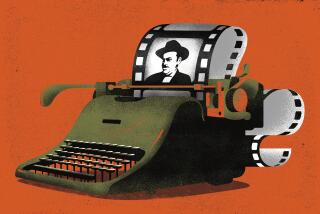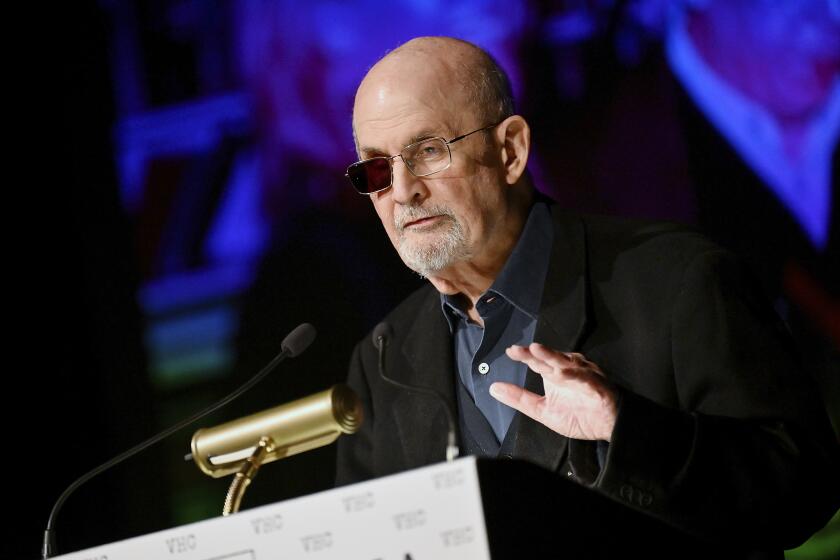In ‘Universal Harvester,’ John Darnielle walks into cornfields, family and horror
It’s hard to feel nostalgic for video stores in an age when renting a movie — thanks to the Internet — is easier than making a cup of coffee. But those who grew up in the ’80s or ’90s might still feel a twinge of sadness when they pass by a vacant storefront that used to house VHS tapes, despite their unreliable video quality and passive-aggressive “Be Kind, Rewind” stickers. There was always the possibility of surprise — a mislabeled tape or a prankster foiling the copy protection tab and adding a weird home movie at the end of “Sleepless in Seattle.”
In “Universal Harvester,” the brilliant second novel from indie rocker (the Mountain Goats) and author John Darnielle, the possibility of that kind of surprise becomes a terrible reality. The novel centers on a small, independent video store in the town of Nevada, Iowa, in the late 1990s whose tapes start coming back with mysterious and sometimes terrifying clips spliced in the middle. What appears to be a chilling horror tale is also a perfectly rendered story about family and loss.
The novel begins with store clerk Jeremy, a sweet 22-year-old whose mother died six years previously, fielding complaints from customers about weird scenes popping up in the middle of the movies “Targets” and “She’s All That.” Some are inscrutable: still scenes of a barn, someone breathing quietly. But others are more alarming: people under a large tarp, who “buck and thrash, sometimes with a rolling movement, sometimes in violent jerks,” crying with “a frightened, choked stream of burbling vowels.”
Jeremy is reluctant to investigate, but the store’s owner, Sarah Jane, recognizes the barn from the area and can’t keep her curiosity at bay. She locates the property and befriends the woman living in the house, Lisa, a mysterious fellow Midwesterner. Sarah Jane begins spending all her time at Lisa’s house, leaving Jeremy and his young co-worker, Ezra, to run the store in her stead.
The second part of the novel focuses on Lisa’s childhood in Iowa. She lives a typical middle-class life with her doting parents until her mother starts attending a mysterious storefront church in Council Bluffs, presided over by a dirty, unkempt young man. One day, Lisa’s mother disappears, leaving only a Christmas card behind.
The two threads of the story come together in a truly scary climax, and it wouldn’t be fair to spoil any of it. Darnielle is a master at building suspense, and his writing is propulsive and urgent; it’s nearly impossible to stop reading.
He’s also incredibly gifted at depicting the dark side of the rural Midwest, as he does in this passage, describing the cornfields of Iowa: “There are other times when people go into the fields and yell different things: ‘Help!’ for example, often repeatedly with increasing volume, or ‘Where are you taking me?’ But nobody usually hears them. A few rows of corn will muffle the human voice so effectively that, even a few insignificant rows away, all is silence, what to speak of out at the highway’s shoulder: all the way back there, already fading into memory now.” “Field of Dreams” this isn’t.
Adding to the creepy atmosphere is Darnielle’s choice of narrator, the identity of whom isn’t revealed until the end. The voice is one of a historian, an interested observer, sometimes speaking directly to the reader, sometimes using phrases like “You or I,” creating a kind of entre nous intimacy that draws you in, makes you feel almost complicit. Frequent references are made to “other versions” of the story, casting a pall of doubt over the book that makes everything unsure, and thus more frightening.
Suspense and ambience count for only so much, though; a horror novel (or any kind of novel) works only with believable characters. And every one in “Universal Harvester” is realistic, especially Jeremy, who finds himself torn between staying at the video store and leaving it behind for more lucrative work. He and his father have grown used to life in a holding pattern following the death of his mother: “These past few years of sitting around waiting for something to solidify: wouldn’t Mom have also understood that? You wait for signs, but there aren’t any signs; you wait a while longer, just in case.”
So while it’s genuinely unsettling, it’s also a heartfelt reflection on family, as well as a kind of love letter to the often overlooked towns of the American Midwest. (Darnielle used to live in the Iowa cities of Grinnell, Colo and Ames, all close to Nevada, the town where the novel is set.)
Darnielle has made dealing with loss a central theme in much of his music, and it runs through “Universal Harvester” as well. The strongest parts of the book are the ones in which characters grapple with the past, with what might have been if something terrible hadn’t happened. “It’s not that nobody ever gets away: that’s not true,” he writes of their small town. “It’s that you carry it with you. It doesn’t matter that the days roll on like hills too low to give names to; they might be of use later, so you keep them. You replay them to keep their memory alive. It feels worthwhile because it is.” Darnielle’s novel is beyond worthwhile; it’s a major work by an author who is quickly becoming one of the brightest stars in American fiction.
Michael Schaub is a writer who lives in Austin, Texas.
John Darnielle
Farrar, Straus and Giroux: 224 pp., $25
More to Read
Sign up for our Book Club newsletter
Get the latest news, events and more from the Los Angeles Times Book Club, and help us get L.A. reading and talking.
You may occasionally receive promotional content from the Los Angeles Times.






